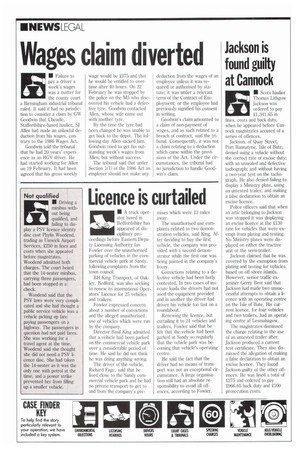Wages claim diverted
Page 20

If you've noticed an error in this article please click here to report it so we can fix it.
• Failure to pay a driver a week's wages was a matter for the county court a Birmingham industrial tribunal ruled. It said it had no jurisdiction to consider a claim by GW Goodwin that Cheadle, Staffordshire-based haulier, Sj Allen had made an unlawful deduction from his wages, contrary to the 1986 Wages Act.
Goodwin told the tribunal that he had 20 years' experience as an HGV driver. He had started working for Allen on 19 February. It had been agreed that his gross weekly wage would be S;175 and that he would be entitled to overtime after 40 hours. On 22 February he was stopped by the police on the M5 who discovered his vehicle had a defective tyre. Goodwin contacted Allen, whose wife came out with another tyre.
By the time the tyre had been changed he was unable to get back to the depot. The following day Allen sacked him. Goodwin tried to get his outstanding week's wages from Allen, but without success.
The tribunal said that under Section 1(1) of the 1986 Act an employer should not make any deduction from the wages of an employee unless it was required or authorised by statute; it was under a relevant term of the Contract of Employment; or the employee had previously signified his consent in writing.
Goodwin's claim amounted to a claim of non-payment of wages, and as such related to a breach of contract, said the tribunal. Consequently, it was not a claim relating to a deduction which came within the provisions of the Act. Under the circumstances, the tribunal had no jurisdiction to handle Goodwin's claim.




















































































